The Werewolf of Mariahilf am Inn II.16
A Gothic Horror Novel
Book II, Chapter 16: The Chapel on the Bluff
List of Chapters | Previous Chapter
Hermann floated in his dream on the breath of a demon, drifting through the catacombs of Santa Maria della Concezione dei Cappuccini, that doleful world beneath the streets of Eternal Rome that Benedikt had described so vividly. His panicked and insubstantial eyes took in the grinning skulls of the dead friars, whose skeletons, wedged between the flickering tapers, filled the dank grottoes of the subterranean walls. He was being drawn to that secret dungeon beneath the catacombs where the Werewolf of Mariahilf am Inn was imprisoned.
A bearded man stood erect and expressionless in the cell. He resembled the imposter who had murdered and assumed the identity of Mariahilf’s imperial toll collector, Baron Eckhart—the cannibal hanged in the valley at sundown in the summer of 1848. But in Hermann’s dream the French Revolution had only just reached its fevered pitch.
The bearded lips twitched and a woman’s voice echoed in Hermann’s mind: “I was there when you drew your first breath. And I shall be there when you draw your last.”
A hand massaged his genitals. The werewolf threw back its head and moaned in unhinged ecstasy between clenched teeth.
Hermann jolted awake because a furry warmth had nestled between his parted legs. He cast the coverlet aside and saw a black shape rear its head. A flashing eye contemplated him in the moonlight. Hermann kicked the cat off the bunk and it ran hissing out of the room.
Groggily, Hermann pounded the thin wall, on the other side of which was Walter’s room. “Florian!” he yelled.
He had collected his senses enough to address the boy by the assumed name he had given him after they fled the workhouse in Cronenberg.
“I’m sorry!” Walter replied. “I don’t know how he got out.”
The orphan had adopted the one-eyed barnyard cat as a pet—against the wishes of Hermann and Benedikt, who both believed it to be a witch’s familiar spirit.
Hermann planted his bare feet on the floor. The coals in the iron pan under his mattress had gone cold. He could see his breath.
“What time is it?” he mumbled to himself
“It’s early,” Benedikt said, appearing at the threshold. “But Monika and I have been up for an hour. There are two nags in the stable; but no guests in the inn. So the only chores you and I will have today will be gathering firewood and exercising the company horses.—Happy Christmas, Brother Moritz.”
“Likewise, Brother Benedikt.” Hermann rubbed his eyes.
Because Monika was within earshot and laying out their Christmas breakfast, the curly-haired ostler thought it wise to address Hermann by his alias. The man stepped inside the bunk-room and went to Hermann, lowering his voice so that neither Walter nor Monika could hear.
“I shall have a Christmas gift for you within a few days.”
“What do you mean?” Hermann furrowed his brows.
“I’ve nearly completed my account of the werewolf’s origins.”
Hermann seized the man’s wrist.
“It is in a legible hand. I am adding commentary where I see fit. I cannot remember everything, but I have tried to be faithful to the details Fr. Matteo communicated them to me during the two years I spent with him. I must confess that it has been liberating to disencumber myself of a weight I have borne for over two decades. Once you have finished reading the manuscript, it must be burned. I fear what might happen were it to fall into the hands of an innocent. Besides, the tale has always been intended for you alone.”
Hermann glanced over his shoulder at the wall separating him from the orphan. “You have my word.”
Benedikt pointed to the wooden figurine on the hutch in the corner of the room—the memento mori that Hermann’s father, Moritz, had carved long ago in Mariahilf.
“There is a placard surmounting the steps leading out of the catacombs of Santa Maria della Concezione,” the ostler said sadly. “It reads in Italian: ‘Come tu sei fui ancor io. Com io sono sarai ancor tu’, which translates to: ‘As you are now, we once were. As we are now, so shall you be’.”
The cat emitted a harrowing yowl from the adjacent room.
“Why are you acting this way, Mürrisch?” Walter scolded his pet. “It’s Christmas. You’ll have extra vittles today.”
Two days after Christmas, Hermann found himself laboring alone in the stable, shoveling shit from the empty stall where the Eltzbacher’s stallion was kept. He heard the gray horse nickering as the ostler led it inside. Hermann opened the stall gate. Benedikt took the shovel from him and handed the reins to Hermann, telling him to remove the tack and fill the nose bag.
This done, Hermann exited the stall and closed the gate as the horse enjoyed its breakfast.
Benedikt stood outside holding a thick notebook in one gloved hand.
“Is that?—”
“Yes,” Benedikt said, yielding it to him.
“May I read it now?”
“If you wish. I have been storing in the stable in a locked chest so that no prying eyes examine it.”
“Walter can’t read.”
“But Monika can. She has expressed curiosity as to what it is I have been scribbling away at in the evenings.”
Hermann sucked in his lower lip. “I shall go behind the stable and read it by the light of the day.”
“Very well. When the horse has eaten I shall remove the bag and return to the carriage house for lunch. I’ll be back within the hour. It should not take you long to read. When I have returned, we shall burn it as I said.”
“Agreed.”
Hermann walked to the back of the stable and pulled a long thick log from the wood pile. He screwed one end of it into the snow to use it as a stool. Drops of water trickled down the crackling ice-sickles. He rested his back against the wood pile (well away from the overhanging eaves).
Opening the dented pasteboard, he admired the clear and elegant kurrentschrift filling the pages front and back. There were minimal blottings and corrections. The narrative filled only three-quarters of the notebook, so the remaining leaves had been cut out with a razor to spare the unused paper before the notebook’s destruction.
Hermann held the pages close to his eyes as he read.
History of the Werewolf of Mariahilf am Inn
You and I were born in the shadow of that alpine chapel that stands on a grassy bluff in the mountain-engirdled valley. Its steeple looms spectrally over the idyllic scene, defiant of the encircling mists that encroach upon it in at the break of day and in the twilight hours. Throughout all of Catholic Europe the Chapel of Mariahilf along the river Inn is famed for the baroque mural on its east wall depicting Our Lady of Mercy. It is a source of comfort for the idle wayfarer who resorts to it for a moment of quiet prayer and meditation.
Nicholas of Cusa, while serving as Bishop of Brixen in the Tyrol in the middle of the fifteenth century, identified the chapel as a well-known halting place for pilgrims traveling through the Brenner Pass to Italy, and thence to the Holy Land. But a scurrilous Protestant pamphlet published anonymously in Erfurt sometime in the seventeenth century and which gained wide currency in the German-speaking south alleges that the Mariahilf chapel was constructed on the foundations of a Roman temple devoted to the cult of Apollo Lycegenes (Apollo the Wolf-Born); and that the bluff on which it stands was a favorite haunt of witches and necromancers as late as the time of the Trentine Council.
Around the chapel lie the graves of the priests and holy men of Mariahilf going back nearly ten generations. But there is one native son of the valley, a former man of the cloth, whose resting place lies outside the limitary stones that mark the boundary between the consecrated and unconsecrated earth: Frater Melchior von Mariahilf am Inn.
Melchior was born in the final months of the War of the Quadruple Alliance, which ended with the signing of the Treaty of The Hague in 1720. He was the only child of a devout stonemason and a strong-willed woman who died shortly after his birth. By the time Melchior came into the world the chapel on the hill seemed on the verge of leaving it. The structure had been reduced to a state of utter desuetude and mossy neglect. It stood among the weeds as a relic of a bygone age.
But the children of the valley often gathered there to disport themselves and play games among the ruins, such as das Versteckspiel (“Hide and Seek”). One afternoon a little girl, whom Melchior boasted he would find within seconds of his counting to 20, managed to hide herself so well that the children never saw her again.
A storm was gathering as the children fled en masse down the hill and to the their homes. They reported to their parents what had happened. A swift account was made of all the girl children in Mariahilf, and in the outlying hamlets close by. But no one claimed a missing daughter. So the adults dismissed the matter, since it is a well known fact that children often have imaginary friends.
Many years later, the village convened a council in the late spring beneath a canopy pitched in Mariahilf’s town square. In the course of the meeting, the aldermen proposed razing the chapel to the ground and erecting a wooden cross in its place. But Melchior’s father urged the assembly to permit him and his son (now a young man) to restore it to its former glory, alluding to the incident of the phantom child and speculating if this might have been a spiritual being and a sign from God. “For my son affirms to this day that he and his friends had seen the girl on several occasions before her disappearance.”
The aldermen gravely assented to the proposal; and the priest lent weight to the proceedings by vowing not only to dip into the parish coffers but to solicit funds from the Archbishop of Salzburg. The able-bodied men of Mariahilf volunteered to assist the stonemason on days when a team was needed. The priest announced at the close of the meeting that when the work was done, he would call for a delegation from the Jesuit College in Ingolstadt to come to Mariahilf in order to rededicate the chapel to Our Lady of Mercy.
Each morning, Melchior and his father loaded up their pushcart with food, water and supplies and headed to the chapel, returning with lit lanterns in the evening. When the roof had been mended and re-shingled to the stonemason’s satisfaction, father and son took to sleeping inside the chapel at night.
In the middle of the summer, Melchior’s father departed for Innsbruck for the space of a week to collect materials and paints that were not readily available in the village, so that he and his son could decorate the east wall with a folk mural of a cross, dove and chalice enwreathed by vines. Melchior was left behind to prime the wall.
One afternoon the boy heard what sounded like a hütchen (a small-hatted fairy) giggling in the graveyard. He stepped outside, blinking in the lambent rays of the sun. Crouching behind a shattered headstone smothered in alpine heather was the most beautiful girl he had ever seen in his life. She raised a finger to her lips to intimate that the boy should remain quiet. When she did this, Mechior saw that the last joint of her finger was missing—just like the finger of his playmate who had vanished long ago.
“Where have you been hiding?” he asked.
The girl sighed because Melchior had startled the cuckoo she had been trying to woo. The bird sang its distinctive song before taking flight.
She rose from behind the gravestone. Melchior stared at her for what seemed like a long time, his throat dry. “Where do you come from? Do you live in another part of the valley?”
Her brows contracted as if she could not quite understand him. “Come,” she said in an accent he did not recognize.
With a swiftness that surprised him she took off, leaping over the cemetery’s boundary stones, descending the hill and running off in the direction of a copse of trees that clad the base of the mountain. Not wanting to lose her for a second time, Melchior followed.
Out of the woods and up the slope they climbed. Soon they had attained that precipice that you and I are well acquainted with—that rise in the foothills where a massive boulder teeters on the brink of an abyss. It is the place where you first encountered the wolf; the place where I first laid eyes on the murdered woman and her babies—the woman who resembled your mother.
The girl sprang onto the boulder and beckoned Melchior to join her there. When he stood beside her, she pointed to an iron ring fastened to the cliff face, around which were tied two sturdy cables of rope (one as a precaution in case the other broke). The ropes ran from the iron ring to another; and another after that. The rings slanted in a downward trajectory along the curved face of the cliff. By gripping the ropes and using the narrow but readily available footholds one could attain those three projecting ledges I have described to you before that hug the curved face of the mountain. But this rope way was only negotiable in the summer months before the ice began to form.
The girl reached the first rock shelf—the one that the aged Fr. Matteo leaped to and waited for me to follow. Then she released the ropes so that Melchior could use them. Before long they stood on that final ledge that snaked around the cliff face and formed a natural ramp that led up into the Waldensian lair.
A low fire smoldered between two pillars of stone. A woman drew water from basin hewn out of a slab of rock that overhung the gorge. Lush vines spilled down from a double-tiered garden not far above. A young man stood up in the garden when he saw them approach. He called out in a language that sounded to Melchior similar to the one spoken by the frequent Piedmontese travelers who passed through Mariahilf.
Something about Melchior had startled the older woman, who he assumed to be the girl’s mother; and who swiftly withdrew into one of the many recesses that honeycombed the face of the cliff. Melchior followed the girl inside. He was awed by the hundreds of maroon crosses and frescoes depicting saints and scenes from the Bible that covered the wrinkled walls.
He could not have imagined a place so wondrous could lay in such close proximity to his home. As amazed as he was by the paintings, he was even more fascinated by the cruciform scars that covered the young man’s face and limbs. Even the skin exposed by the tunic revealed similar wounds on the flesh. His hair was shaved close to his scalp.
Melchior asked in German (since that was the only language he knew) if the boy was the painter and if he had used his own blood to make the frescoes.
“I have used my blood,” the boy replied, haltingly. “But I have also used natural dyes that my mother makes for me.” He looked at the paintings as if seeing them for the first time. “I did not make all of these. Of course, I did not. Others before me—spirits far greater than mine—left these marks as if to say ‘I was here’.”
Whereas the girl could not speak German, the boy not only spoke it fluently but with a volcanic intensity laced with a gnomic intonation that made even inconsequential things seem profound. His name was Théophile; and he introduced his sister as Élise. (Nota bene: Élise is a variation of your mother’s name, Ilse.)
Melchior asked which of the Blessed Ones Théophile had painted. The boy pointed casually to an image of Saint Andrew.
“I could never paint anything so detailed,” Melchior said. “My father took me to Innsbruck once where I saw figurative art in the churches so realistic that you could almost see them breathe. I carry the memory of those paintings with me in my heart. I remember every lineament of every face.”
Théophile translated what Melchior had said to his sister, who blushed and replied.
“What is she saying?”
“Only what I thought the moment I laid eyes on you: You too shall be a painter. You have a talent within you that far surpasses mine.”
Melchior regarded brother and sister incredulously. “Who are you people?”
“We are Christians, like you. We revere the same Bible as you. But we also adhere to the teachings of a scripture you will not have heard of: La nobla leyczon (The Great Lesson). We are disparaged by your Church as heretics—Waldenses, a name we did not give ourselves. It derives from our founder, Pierre Vaudès. Centuries ago the poor of Lyon fled into the mountains to avoid the scourge of the Inquisition. My forefathers chose to remain here, in hiding, long after the great persecutions had ended. The consequence of this is that we are now considered outcasts among our own kind. My father, mother, sister and I are all that is left of a once proud and thriving community.”
“I shall not disclose your secret,” Melchior said, gazing solemnly over Théophile’s shoulder at Élise.
“I know,” the boy smiled, almost wistfully.
“Why do you say that? Surely you do not plan to detain me here?”
The boy translated what Melchior had said to his sister, who shook her head.
Théophile placed his hand on Melchior’s shoulder. “My sister would not have led you here if she sensed you were a threat. I want you to meet my father. He is dying. But he has been expecting you.”
The three of passed through a long chamber that served as a columbarium, or dovecote. The birds cooed and nestled in their arched holes.
“What are these birds here for?” Melchior asked.
“For meat and sacrifice.”
Élise, who was walking just behind Melchior, stroked his hair as they entered an adjacent chamber. Théophile saw her do this but seemed unconcerned by her forwardness. The siblings’ mother emerged from an alcove, hair wrapped in white clouts. She regarded Melchior with expanding eyes, as if he had grown in her presence. An interrogative whisper fell from her lips.
“I wish I could understand what you people are saying about me,” Melchior sulked.
Théophile plucked a louse from his scalp. “She asks if you are here to save us.”
“What does she mean by that?”
“My sister has chosen you as her mate. My mother hopes that our family will live on.”
“Girls don’t choose their mates,” Melchior grimaced.
“They do among us. My sister has dreamed that you would be hers one day—ever since she was a child and would sneak into the valley to play with you and your friends.”
Melchior glanced at Élise, who had slunk behind her mother and was peeping at him from around the woman’s trembling arm. The girl covered her eyes with her hands, as if she were again playing hide-and-seek. She blew Melchior a kiss, which he caught with a comic flourish of the wrist. Élise laughed, and her mother’s features softened.
Melchior could not believe his fortune. But a part of him wondered if it were wise to forge bonds with a people whom Mother Church had accused of straying from the true path.
Théophile emitted a gruff directive to his mother and sister and tugged at Melchior’s elbow. Presumably the boy had told them that the interview with the dying patriarch was for the men alone.
Théophile linked his arm with Melchior’s and guided him through a labyrinth of interlocking corridors that emptied out onto a paved promenade outside the mountain that skirted a vertiginous ledge. Théophile explained that this had once served as a ceremonial way and the main thoroughfare fronting the dwellings of the community’s notables. To their right stood the lofty arched chambers, now vacant and stripped of all decor and furniture, where the prominent families had lived.
A thought came to Melchior. “How is that you are not married? Or have you taken a vow of celibacy?”
“We do not practice celibacy, which we hold to be contrary to the teachings of our Lord and Savior. I shall marry someday. But I cannot leave my family at this time to search for a wife.”
The boy glanced at Melchior uneasily.
They arrived at those grim chambers that serve as a kind of vestibule for that portal into the netherworld of which I have given you a harrowing account. Théophile translated the ancient Latin inscriptions that were carved into the walls.
“If you have lived in this mountain all your life,” Melchior said, “how is it you are fluent in Latin and German?”
“Our ancestors were learned men and passed their knowledge down generation after generation. My father taught me Latin so that I could read Jerome’s Bible. Those of us, such as myself, who were chosen to go out into the world and preach our message were taught to speak German. My mission lasted three years.”
“And you couldn’t find a wife during that time?”
Théophile lowered his head in shame.
“Did you go alone?”
“No. I had a companion. But he died before our mission truly began.”
“What do you mean?”
“When we missionaries become men at the age of fourteen, we leave the mountain through that corridor.” His brow darkened. “The way is hard; and only those whom God smiles on make it out alive. I am lucky to have escaped with my reason intact. My mission companion was driven mad and took his own life.”
Melchior suspected that the experience had also scathed Théophile’s mind and contributed to his peculiar mannerisms. The boy was too fanatical to step outside himself and see how strange he appeared to others. He will never find a wife, Melchior thought, unless it should be one as mad as he.
As if to confirm this, Théophile unconsciously picked at a scab on his temple, which caused a cross-shaped wound to bleed. “Many are called,” he observed. “But few are chosen.”
“And you believe that you are one of the chosen one’s, Théophile?”
“No,” he replied, discounting the audaciousness of the question with a flick of the hand; and fixing Melchior with an expression as if to say, ‘But perhaps you are’.
The stonemason’s son turned away, discomfited. He noticed a pair of eyes staring at him from a cot hidden in the shadows.
“That is my father,” Théophile whispered.
“What is doing here? If he is ill, why is he not swathed in blankets by a fire?”
“It is our custom to bring the dying here, so that when they are called to God, the carrion birds may easily find them and pluck the flesh from their bones. These chambers are cut in such a way so as to funnel the mountain winds and keep the noisome stench from the residential quarters.”
“My God, that’s monstrous.”
“How so, monstrous? What is the body once the spirit has departed it but a sack of bones.”
The figure on the cot muttered a phrase in their language, which Théophile translated: “Know you not that your body is the temple of the Holy Ghost, which is in you and which you have of God?”
Melchior quietly approached the cot. The man’s grizzled beard was damp with sweat. The limpid blue eyes (though rheumy) twinkled. He spoke again as his son interpreted.
“My father says that you are indeed blessed, as my sister has long affirmed. He prophesies that, just as you were created in the image of the Creator, so shall you honor Him by creating an image that exalts and glorifies the Creatrix, His Holy Mother.”
The man closed his eyes and uttered a phrase in Latin that came to him through inspiration: “Ignis artificis quique.”
”What does that mean?” Melchior asked.
Tears welled in Théophile’s eyes. “It means, ‘The flame of the Divine Artificer is in each and every one of us.’”


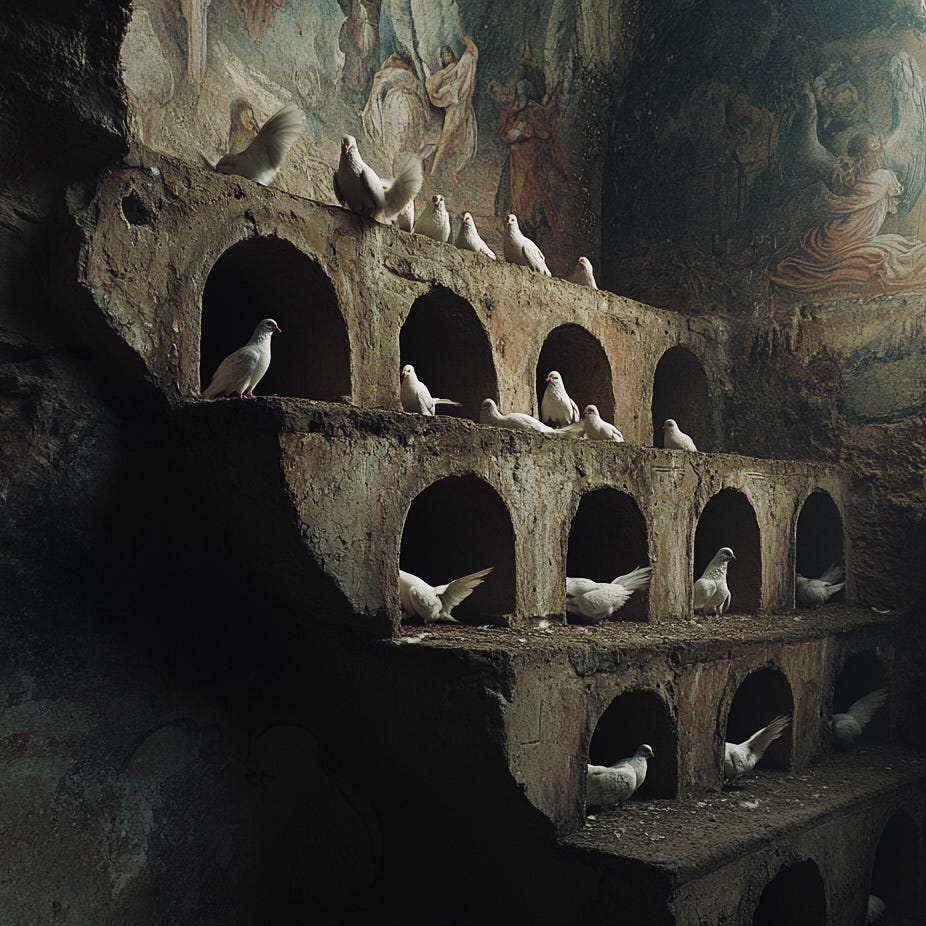
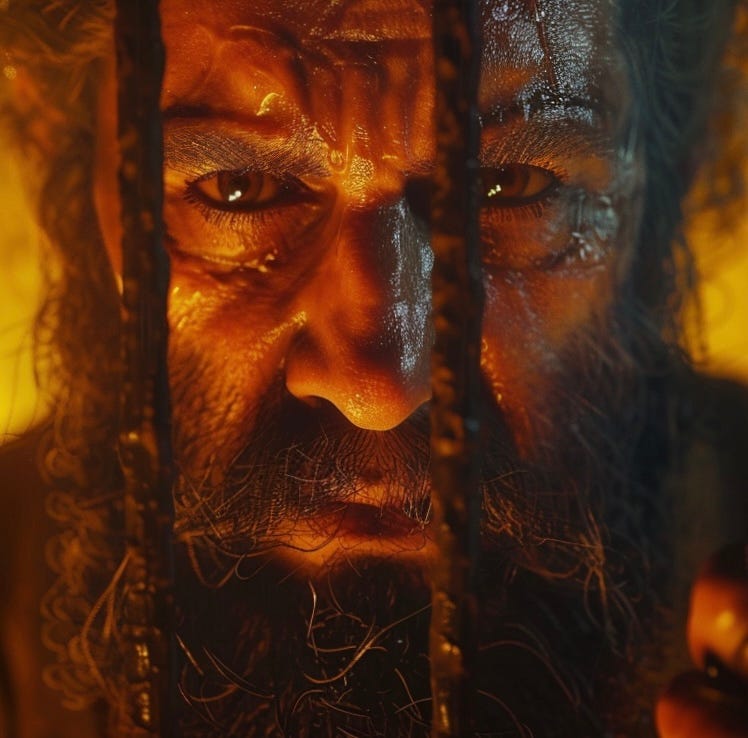
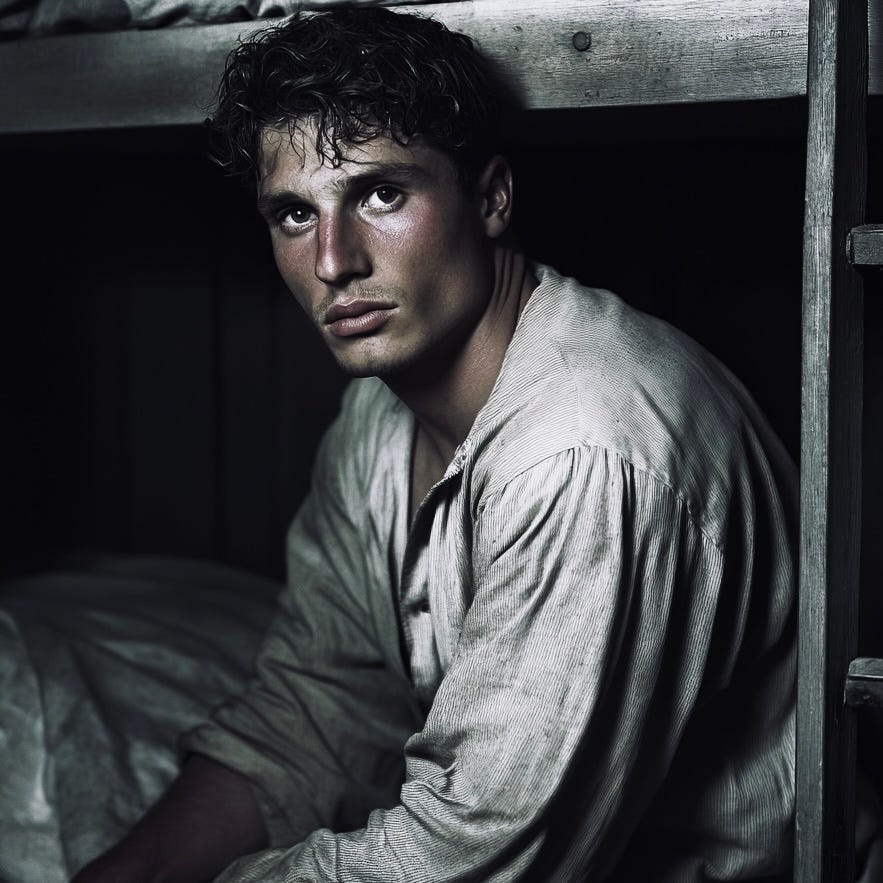
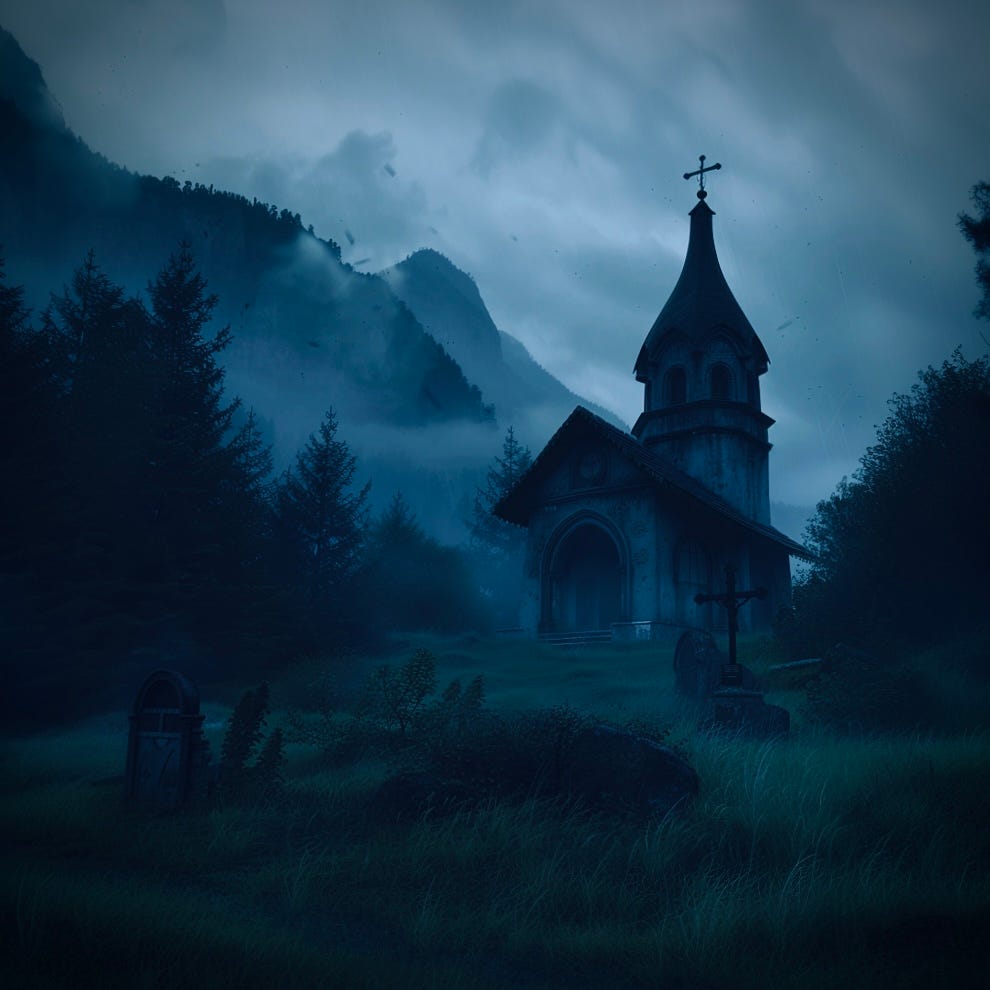
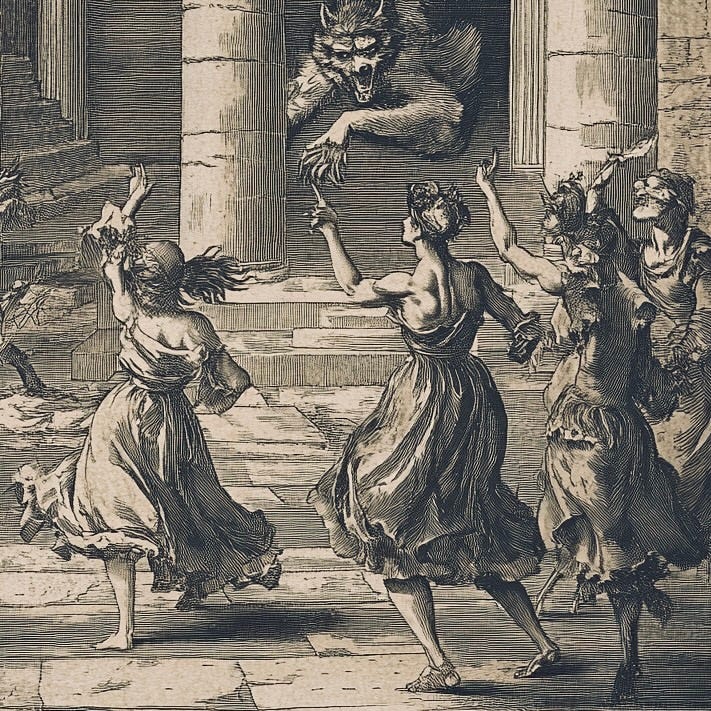
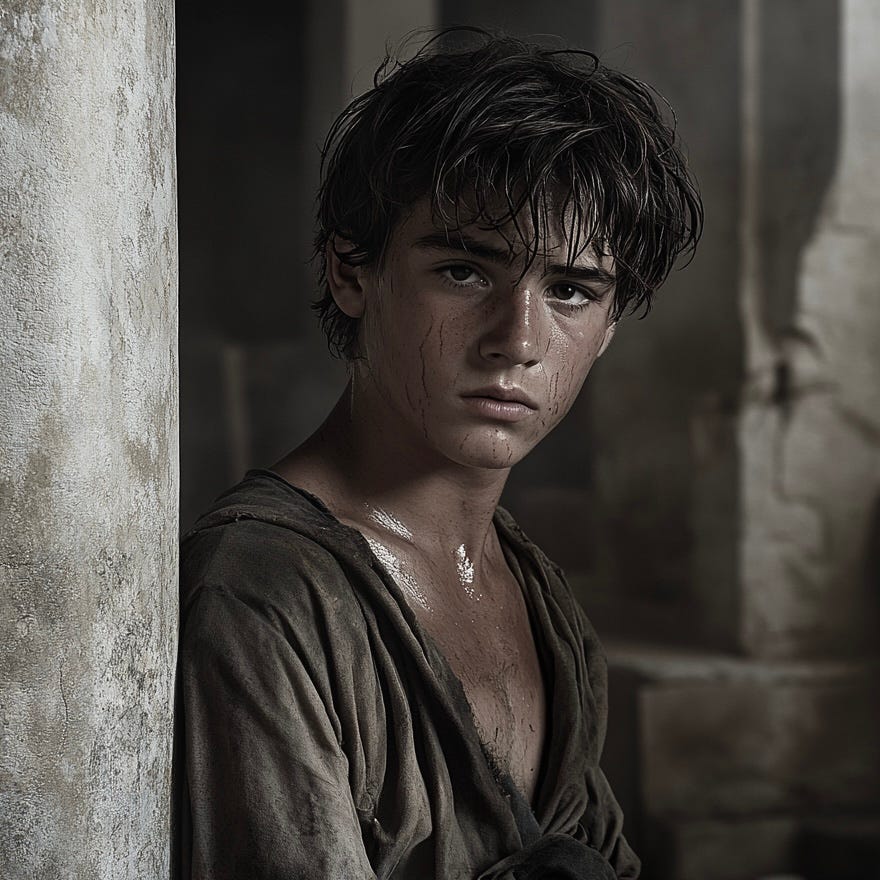

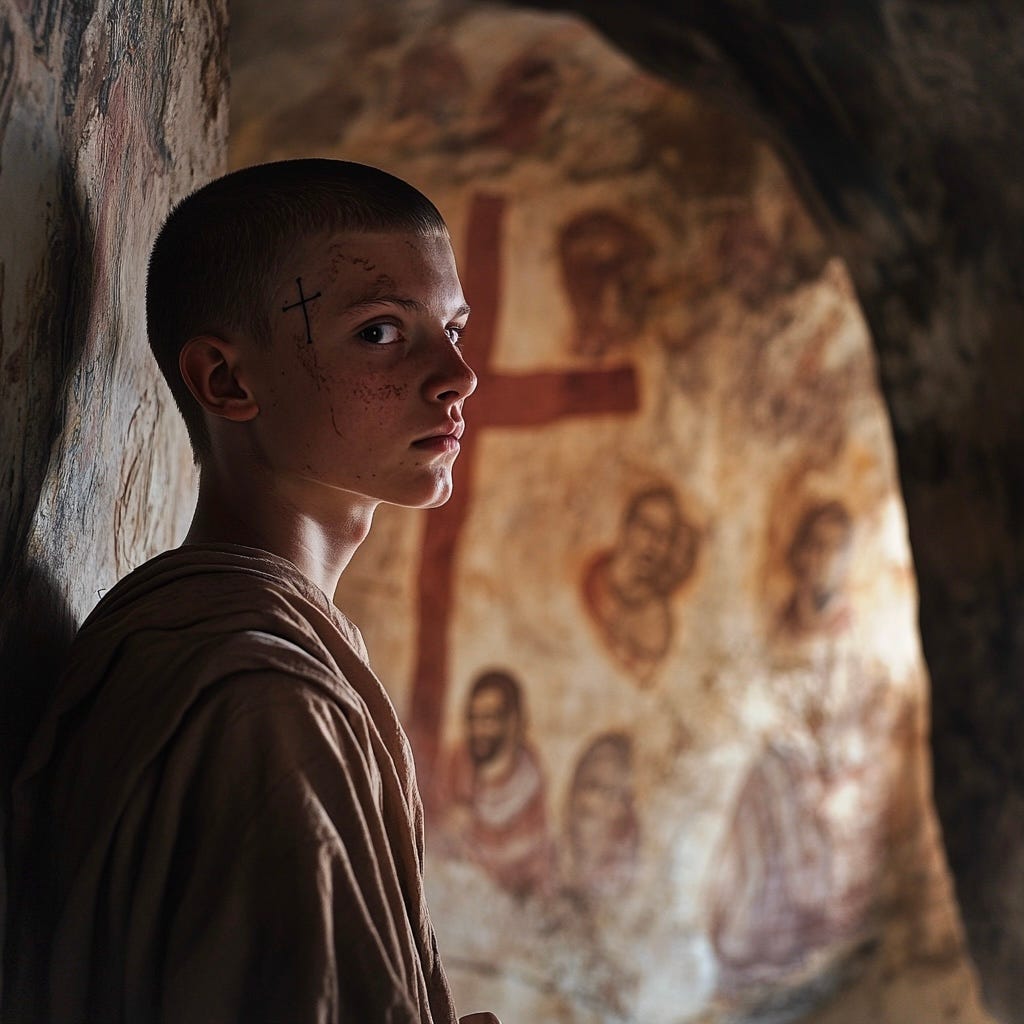


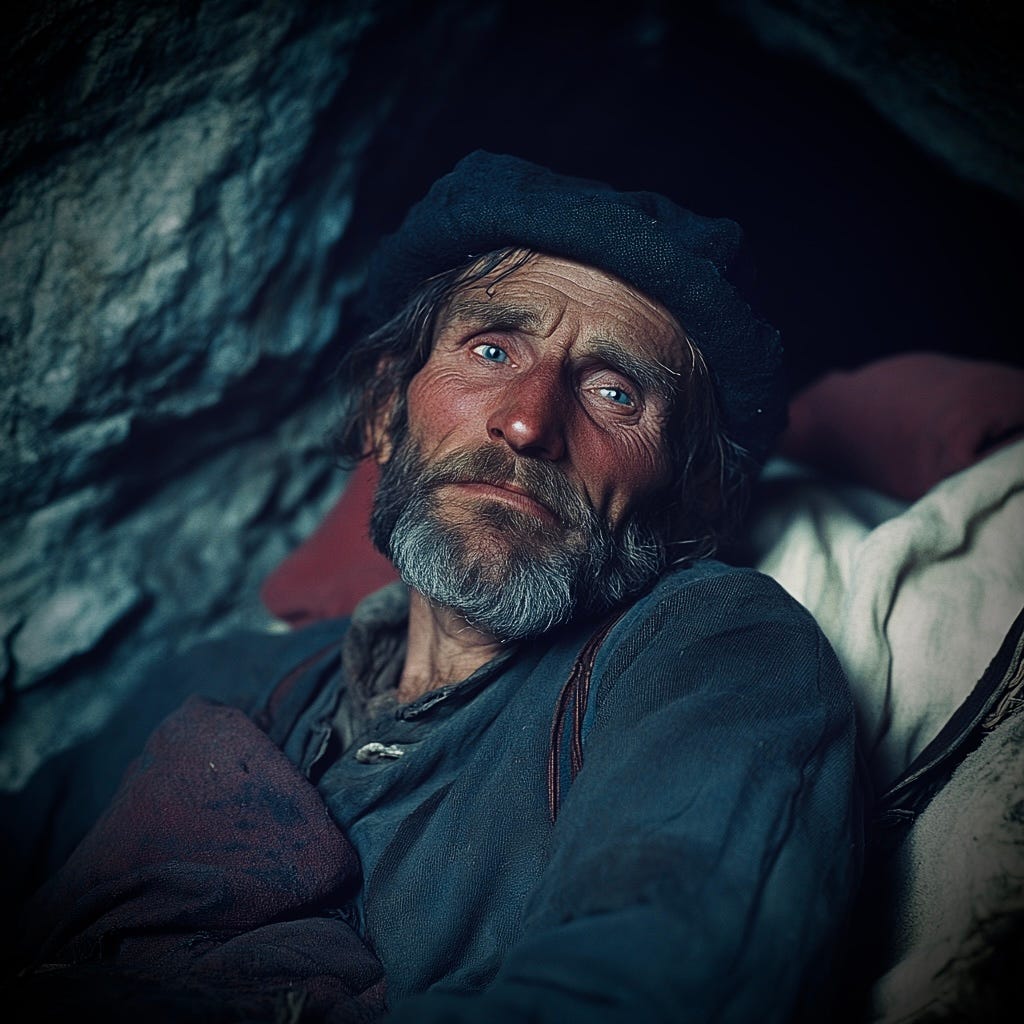
A clever way to loop back to the beginning with the notebook! Excellent work, Daniel.
I also fell behind Daniel, with real life conflictions. Now caught up, I continue to be fascinated by this unfolding tale of a cursed family lineage skillfully supported with historical artifacts and references, much of which was largely unknown to me. Such an educational experience!